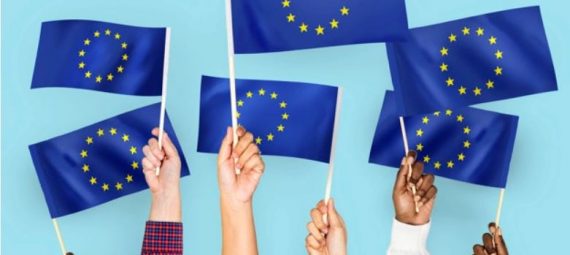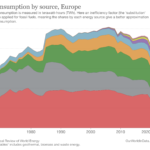JOHANNES EBER
This article was originally written for the “Good morning Europe” blog (www.goodmorningeurope.substack.com) by Johannes Eber. We were given permission to publish this article on the European Liberals for Reform blog.
Do you feel like being European?
Then you are part of a growing majority. At least Eurobarometer says so.
Eurobarometer is a series of public opinion surveys conducted regularly primarily on behalf of the European Commission. These surveys address a wide variety of topical issues. Among others, it measures European identity. That identity describes the feeling of being European.
The trend is pretty clear in recent years. More and more people feel that they belong not only to a nation but also to Europe.

I took the screenshot above from the paper “Fostering European Identity” written by the economists Sarah Ciaglia (London School of Economics and Political Science), Clemens Fuest (Ifo Institut and Ludwig-Maximilians-University Munich) and Friedrich Heinemann (ZEW Mannheim and University of Heidelberg).
On the chart, you can see that the share of respondents that state to possess some type of European identity (either exclusively or in combination with a national identity) has fluctuated over these three decades between a minimum of 51 per cent in 2010 and a maximum of 65 per cent for the most recent surveys in 2019. The share is tending to increase.
What are the reasons? The authors summarized the results of other studies in their paper. Here are some findings:
- While travelling has a positive effect on European identity, being exposed to a high number of tourists at home does not show any effect on European identity.
- Another paper – that is quoted in “Fostering European Identity” – studied international social interactions of about 1,500 German students and found that contactincreases European identity, particularly for those students who have had a rather weak European identity before.
- Besides these individual European experiences, socio-economic situations drive European identity formation. From the paper: “European identity increases with higher levels of education that is highly correlated with socioeconomic status. Similarly, knowledge and information about the EU and politics increase the likelihood to have a European identity.”
- Also, not surprisingly, foreign language proficiency as a particular education dimension is shown to be an important asset to engage in transnational contact or debating politics, and in turn, strengthen European identity.
- Further, personality traits and values affect European identity. Extraversion (which is how energetic, sociable and friendly a person is) increases European identity, while agreeableness (in the sense of being gentle and polite) decreases it. Another study finds that pessimists are a lot less likely to feel European. Also, postmaterialism and cosmopolitan and liberal values positively affect a supranational or European identity.
- Age has been confirmed in the literature as amajor determinant of European identity, the paper says. Across the world, young people tend to have higher levels of supranational identity than people at older ages.
Author Profile

-
Founder of the "Good morning Europe blog" and Pixel economist
Guest author for European Liberals for Reform
Johannes' articles are originally written for the “Good morning Europe” blog (www.goodmorningeurope.org) and the Pixel economist (https://thepixeleconomist.substack.com).
We were given permission to publish his articles on the European Liberals for Reform blog.
Latest entries
Post Disclaimer
The opinions expressed by the author of this post do not necessarily represent the opinions and policies of ELfR.




